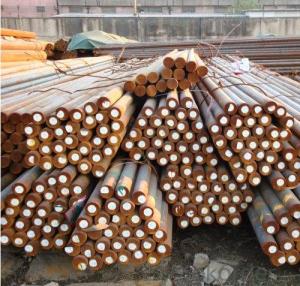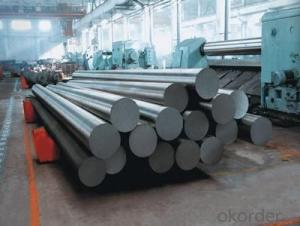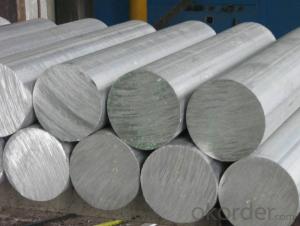Hot Forged 1045 Carbon Round Steel Bar with black/turned/grinded
- Loading Port:
- China main port
- Payment Terms:
- TT OR LC
- Min Order Qty:
- 25 m.t.
- Supply Capability:
- 1000 m.t./month
OKorder Service Pledge
OKorder Financial Service
You Might Also Like
Item specifice
Hot forged 1045 carbon round steel bar with black/turned/grinded
Product information
1. Produce Standard: GB, AISI, ASTM, SAE, EN, BS, DIN, JIS
2. Produce processes: Smelt Iron -EAF smelt Billet - ESR smelt Billet -Hot rolled or forged get the steel round bar and plate
3. Heat treatment: Normalized / Annealed / Quenched+Tempered
4. Quality assurance: All order we can received third party inspection, You can let SGS, BV,.. and others test company test and inspect our products before Goods shipping.
Product detail
| Material | AISI 1045, S45C, C45, 1.0503, 45 | Round bar | Dia(mm) | Max 700 |
| Process | EAF + LF + VD + Forged + Heat Treatment (optional) | Length (mm) | Max 12000 | |
| Heat treatment | Normalized / Annealed / Quenched / tempered | Plate bar | Thickness(mm) | Max 200 |
| Delivery condition | Hot forged +Rough machined (black surface after Q/T)+ Turned (optional) | Width(mm) | Max 3000 | |
| Test |
Product show
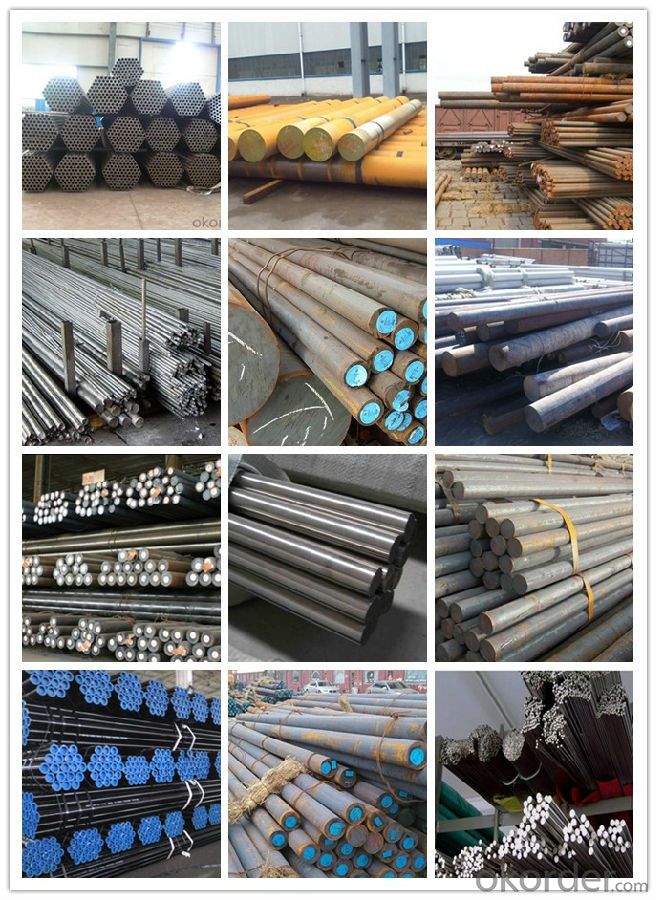
Work shop
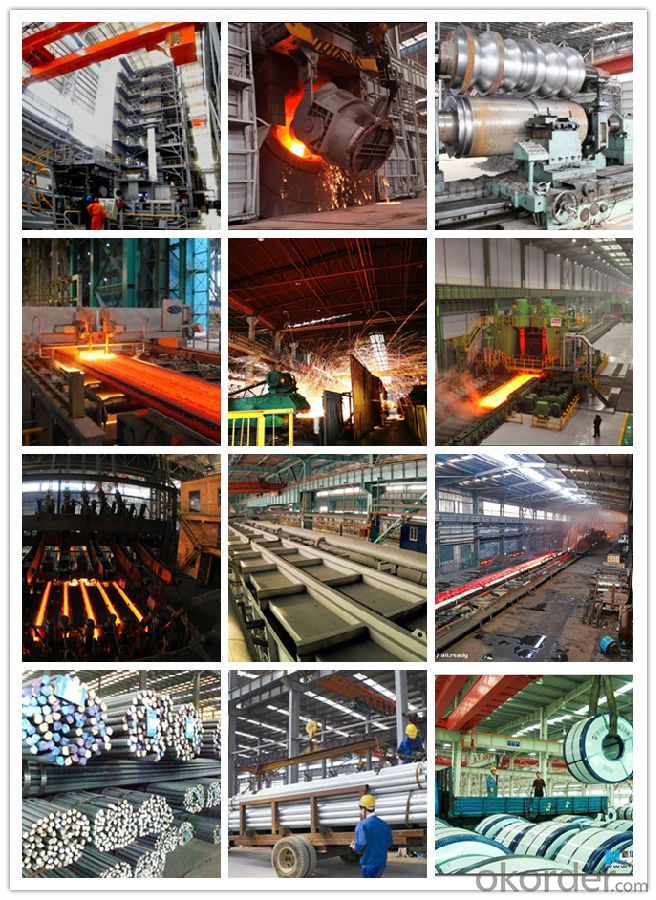
Our Services
* Welcome to contact us with your detailed inquiry, you will be replied within 24 hours.
* You are promised to obtain the best quality, price and service.
* We'd like to provide samples for your confirm.
- Q:What are the requirements for special steel used in high-temperature applications?
- Special steel used in high-temperature applications, such as in the aerospace, power generation, and oil and gas industries, needs to meet certain requirements to ensure its performance and durability in extreme conditions. Some of the key requirements for special steel used in high-temperature applications are: 1. High Temperature Strength: Special steel used in high-temperature applications should possess excellent strength and resistance to deformation at elevated temperatures. This is crucial to ensure the structural integrity of components and prevent any form of failure or deformation under extreme heat. 2. Oxidation Resistance: The steel should have a high resistance to oxidation, which is the reaction between the metal and oxygen at high temperatures. Oxidation can lead to the formation of oxides on the surface of the steel, which can weaken its structure and compromise its performance. 3. Creep Resistance: Creep is the gradual deformation of a material under constant stress at high temperatures. Special steel used in high-temperature applications should have excellent creep resistance to prevent any excessive deformation or failure over time. 4. Thermal Stability: Special steel should have good thermal stability, meaning it can retain its mechanical properties even after prolonged exposure to high temperatures. This ensures that the steel remains reliable and performs consistently in extreme heat conditions. 5. Corrosion Resistance: In addition to oxidation, special steel used in high-temperature applications should also have good corrosion resistance. This protects the steel from the harmful effects of various corrosive agents, such as acids, alkalis, and salts, which may be present in the environment. 6. Thermal Fatigue Resistance: Thermal fatigue is the damage caused by repeated heating and cooling cycles. Special steel used in high-temperature applications should have high resistance to thermal fatigue to prevent any cracking, fracturing, or failure due to the stress caused by temperature changes. 7. Low Thermal Expansion: Special steel should have low thermal expansion to minimize dimensional changes and maintain dimensional stability under high-temperature conditions. This ensures that the steel retains its shape and size accurately, preventing any unwanted distortions or misalignments. 8. Good Weldability: Special steel used in high-temperature applications should have good weldability to facilitate the fabrication and joining of various components. This allows for the construction of complex structures and assemblies required in high-temperature environments. Meeting these requirements ensures that special steel used in high-temperature applications is capable of withstanding extreme heat, maintaining its structural integrity, and providing reliable performance in demanding conditions.
- Q:How is special steel used in the production of molds and dies?
- Special steel is used in the production of molds and dies due to its exceptional properties, such as high hardness, wear resistance, and heat resistance. These characteristics make it ideal for shaping and forming various materials, including metals and plastics. Special steel can withstand the high pressures and temperatures involved in the molding and die casting processes, ensuring durability and precision in the production of molds and dies.
- Q:What are the different forms in which special steel is available?
- Special steel is available in various forms such as bars, sheets, plates, coils, tubes, pipes, and wires.
- Q:How is corrosion-resistant tool steel used in the production of molds and dies?
- Corrosion-resistant tool steel is used in the production of molds and dies to ensure the longevity and durability of these tools. Since molds and dies are often exposed to harsh environments and corrosive elements, using corrosion-resistant tool steel helps to prevent rust and corrosion, which can lead to premature wear and damage. This type of tool steel also provides excellent strength, hardness, and wear resistance, allowing molds and dies to withstand high-pressure and high-temperature conditions without compromising their performance. Overall, the use of corrosion-resistant tool steel in the production of molds and dies ensures the production of high-quality and long-lasting tools that can withstand the demands of various manufacturing processes.
- Q:What are some examples of special steel alloys?
- Various industries widely use special steel alloys, and stainless steel serves as one prominent example. It boasts a minimum chromium content of 10.5%, rendering it highly resistant to corrosion. Stainless steel finds common applications in the manufacturing of kitchen utensils, medical equipment, and automotive parts. Another prime instance is tool steel, which possesses exceptional hardness and wear resistance. This type of steel often finds use in the production of cutting tools, molds, and dies. High-speed steel stands as yet another distinct special steel alloy renowned for its ability to maintain hardness under elevated temperatures. This quality makes it ideal for manufacturing cutting tools employed in high-speed machining operations. Alloy steel falls into a broad category that encompasses various steel alloys, each exhibiting specific properties. For instance, low alloy steel incorporates small quantities of other elements like manganese, nickel, or silicon to enhance its strength and toughness. The construction industry frequently employs this steel type. Additionally, maraging steel represents a unique alloy combining high strength with excellent toughness. Aerospace applications, including aircraft landing gear and missile components, often rely on its capacity to withstand high stress and impact. In conclusion, the aforementioned examples merely scratch the surface of the extensive range of special steel alloys available. Each alloy caters to specific requirements and applications, spanning industries from construction to aerospace.
- Q:What are the specific requirements for special steel used in nuclear applications?
- Special steel used in nuclear applications has specific requirements to ensure its suitability and safety within the highly demanding and sensitive nuclear environment. These requirements are designed to guarantee the integrity and performance of the steel in various conditions, including extreme temperatures, radiation exposure, and corrosive environments. One of the primary requirements for special steel used in nuclear applications is high strength and toughness. The steel must possess excellent mechanical properties to withstand the immense pressure and stress that it will experience during operation. This enables the steel to resist deformation, cracking, and failure, ensuring the structural integrity of nuclear components. Another crucial requirement is the ability to withstand high temperatures and thermal cycling. Nuclear reactors operate at elevated temperatures, and the steel must retain its mechanical properties even under extreme thermal conditions. This prevents any degradation or loss of strength that could compromise the safety and efficiency of the nuclear system. Furthermore, special steel used in nuclear applications must exhibit exceptional resistance to corrosion and oxidation. The nuclear environment can be highly corrosive due to the presence of various chemicals and coolants, such as water, steam, and coolant gases. The steel must possess a high level of corrosion resistance to prevent any degradation or material loss, which could lead to leaks or failures. Radiation resistance is also a critical requirement for special steel used in nuclear applications. Nuclear reactors emit ionizing radiation, which can damage the structure and properties of conventional materials. Therefore, the steel must have a high resistance to radiation-induced embrittlement and degradation, ensuring its long-term performance in a radioactive environment. Additionally, the steel used in nuclear applications must comply with strict quality control and certification standards. These standards ensure the steel's traceability, material composition, and manufacturing processes, guaranteeing its reliability and compliance with regulatory requirements. Quality control measures include non-destructive testing, ultrasonic examinations, and material certification. Overall, the specific requirements for special steel used in nuclear applications encompass high strength, toughness, thermal stability, corrosion resistance, radiation resistance, and adherence to stringent quality control standards. Meeting these requirements is crucial to ensure the safe and reliable operation of nuclear systems while mitigating potential risks associated with the nuclear environment.
- Q:What are the different methods of preventing hydrogen embrittlement in special steel?
- There are several methods that can be employed to prevent hydrogen embrittlement in special steel. These include proper material selection, such as using low-hydrogen alloys or stainless steel grades that are less susceptible to embrittlement. Additionally, controlling the environment during manufacturing and storage processes is crucial, as hydrogen absorption can occur during these stages. Other preventive measures include heat treatment processes like stress relieving and tempering, which can help reduce internal stresses and enhance the steel's resistance to embrittlement. Overall, a combination of careful material selection, controlled environments, and appropriate heat treatment techniques can effectively prevent hydrogen embrittlement in special steel.
- Q:What are the applications of special steel in the automotive supply chain?
- Special steel has various applications in the automotive supply chain. It is commonly used in the production of critical components such as engine parts, axles, gears, and suspension systems. Special steel provides high strength, durability, and corrosion resistance, contributing to improved performance and safety in vehicles. Additionally, it enables weight reduction, enhancing fuel efficiency and reducing emissions. Overall, special steel plays a crucial role in enhancing the reliability, efficiency, and sustainability of the automotive industry.
- Q:Can special steel be used in the production of knives and blades?
- Yes, special steel can indeed be used in the production of knives and blades. Special steels, such as stainless steel or high-carbon steel, possess properties like corrosion resistance, hardness, and toughness that make them ideal for manufacturing durable and high-performance knives and blades. These steels are often chosen for their ability to retain sharpness, withstand heavy use, and resist rust, ensuring the longevity and reliability of the knives and blades.
- Q:What are the main applications of special steel in the mining transportation?
- Special steel is widely used in mining transportation for various applications. One of the main applications is in the manufacturing of mining equipment such as drill bits, cutting tools, and conveyor belts. Special steel's superior strength, hardness, and resistance to wear and corrosion make it ideal for these components, ensuring their durability and longevity in harsh mining environments. Additionally, special steel is also used in the construction of mine shafts, tunnels, and bridges, where its high tensile strength and resistance to extreme temperatures are crucial. Overall, special steel plays a vital role in enhancing the performance, safety, and efficiency of mining transportation systems.
1. Manufacturer Overview |
|
|---|---|
| Location | |
| Year Established | |
| Annual Output Value | |
| Main Markets | |
| Company Certifications | |
2. Manufacturer Certificates |
|
|---|---|
| a) Certification Name | |
| Range | |
| Reference | |
| Validity Period | |
3. Manufacturer Capability |
|
|---|---|
| a)Trade Capacity | |
| Nearest Port | |
| Export Percentage | |
| No.of Employees in Trade Department | |
| Language Spoken: | |
| b)Factory Information | |
| Factory Size: | |
| No. of Production Lines | |
| Contract Manufacturing | |
| Product Price Range | |
Send your message to us
Hot Forged 1045 Carbon Round Steel Bar with black/turned/grinded
- Loading Port:
- China main port
- Payment Terms:
- TT OR LC
- Min Order Qty:
- 25 m.t.
- Supply Capability:
- 1000 m.t./month
OKorder Service Pledge
OKorder Financial Service
Similar products
New products
Hot products
Related keywords
